Breus Surname Ancestry ResultsOur indexes 1000-1999 include entries for the spelling 'breus'. In the period you have requested, we have the following 12 records (displaying 1 to 10): Buy all | | | Get all 12 records to view, to save and print for £54.00 |
These sample scans are from the original record. You will get scans of the full pages or articles where the surname you searched for has been found. Your web browser may prevent the sample windows from opening; in this case please change your browser settings to allow pop-up windows from this site. Fine Rolls
(1216-1246)
The fine rolls of the 1st to 30th years of the reign of king Henry III record part of the government administration in England. These excerpts from the rolls list in transcript applications by plaintiffs for various writs (such as 'ad terminum' and 'pone') and for assizes to be held by the justices in eyre to look into their grievances. A fine of half a mark (6s 8d) or a mark (13s 4d) was usually levied; the cases are normally identified by county, and record that the appropriate sheriff had been notified. There are also more extensive records, in which more detail is given. The excerpts were made by the Record Commission and printed in 1835.BREUS. Cost: £4.00.  | Sample scan, click to enlarge

| Liberate Rolls
(1260-1267)
These chancery liberate rolls of the 45th to 51st years of the reign of Henry III of England record the details of payments and allowances as part of the administration of government. Most entries start with the Latin words 'liberate', meaning 'deliver', or 'allocate', meaning allow. There are also 'contrabreves', warrants mainly to sheriffs of shires, assigning them tasks and allowing expenses. Most of the entries relate to England and Wales, but there are occasional references to Ireland and the English possessions in France.BREUS. Cost: £4.00.  | Sample scan, click to enlarge

| Patent Rolls: entries for Cornwall
(1277-1278)
Calendars of the patent rolls of the reign of king Edward I are printed in the Calendars of State Papers: but these cover only a fraction of the material on the rolls. From 1881 to 1889 the reports of the Deputy Keeper of the Public Record Office also include calendars of other material from the rolls - about five times as many entries as in the State Papers - predominantly mandates to the royal justices to hold sessions of oyer and terminer to resolve cases arising locally; but also other general business. The calendar for the 6th year of king Edward I [20 November 1277 to 19 November 1278], hitherto unindexed, is covered here.BREUS. Cost: £6.00.  | Sample scan, click to enlarge
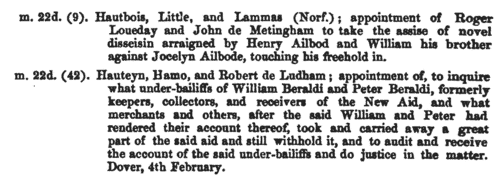
| Patent Rolls
(1278-1279)
Calendars of the patent rolls of the reign of king Edward I are printed in the Calendars of State Papers: but these cover only a fraction of the material on the rolls. From 1881 to 1889 the reports of the Deputy Keeper of the Public Record Office also include calendars of other material from the rolls - about five times as many entries as in the State Papers - predominantly mandates to the royal justices to hold sessions of oyer and terminer to resolve cases arising locally; but also other general business. The calendar for the 7th year of king Edward I [20 November 1278 to 19 November 1279], hitherto unindexed, is covered here.BREUS. Cost: £6.00.  | Sample scan, click to enlarge
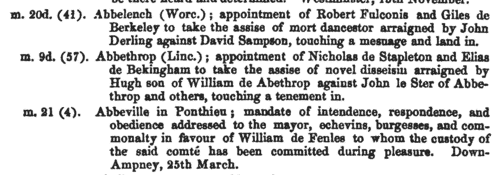
| Grantees of offices, commissions and pardons
(1272-1281)
The Patent Rolls are the Chancery enrolments of royal letters patent. Those for the 1st to the 9th years of the reign of king Edward I (29 November 1272 to 17 November 1281) were edited for the Public Record Office by J. G. Black, and published in 1901. The main contents are royal commissions and grants; ratifications of ecclesiastical estates; writs of aid to royal servants and purveyors; and pardons. BREUS. Cost: £2.00.  | Sample scan, click to enlarge

| Guisborough Cartulary
(1119-1300)
The Augustinian (black canons) priory of the Blessed Virgin Mary at Guisborough (Gyseburne) near Middlesbrough in north Yorkshire, was founded about 1119 by Robert de Brus. The 1100 or so grants of land (mostly in Cleveland) made to the priory from then well into the 13th century were copied into a cartulary or chartulary which survives as Cottonian Manuscript Cleopatra d ii (British Library). This was edited by W. Brown and published by the Surtees Society from 1889. This second part contains the charters numbered DXCIV to MCLXXXIX. The texts have been stripped of repetitious legal formulae, retaining the details of the grantors, the property, and the witnesses: so the individuals named are mainly local landowners and tenants, canons, servants and wellwishers of the monastery. The charters before 1250 are often undated. The charters in this section are arranged by place, under the heads 'Normanby; Martona; Thornaby; Ugthorpe et Pecibiggyng; Levingtona; Jarum; Castle Levington; Kepwyck; Feyceby; Atona; Thresk; Neuton; Estona; Lackenby; Lyum; Cotum; Scheltona; Brottona; Moresom; Glasedale Daneby et Moresum; Kylton; Lofthus; Esingtona; Lyverton; Daneby; Glasdale; Uggethorpe; Percybyggyng; Sletholme; Scalynge; Redker; Merske; Hesele; Lunde super le Walde; Kirkburn; Rotsea; Bainton; Tibthorpe; Ingleby Arncliff; East Harlsey; Sawcock; Scarth; Stokesley; Kirkby-in-Cleveland; Battersby; Stainton-in-Cleveland; Maltby; Ayresome; York; Sinnington; Barningham and Newsham; Aylesby; Kelsterne; Bridekirk and Appleton; Aislaby; Hart and Hartlepool; Castle Eden; and Annandale'. Three further sections are added from other sources: 1. Documents connected with the burning of the priory church in 1289; 2. Extracts from the registers of the archbishops of York relating to the priory, 1238 to 1337; 3. A rent roll of the priory of about 1300 (pp. 412 to 450), giving many names of tenants.BREUS. Cost: £4.00.  | Sample scan, click to enlarge
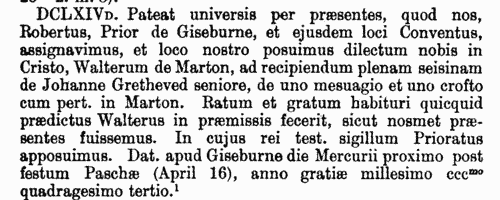
| Clerks and Clergy in Herefordshire, Shropshire and Gloucestershire, Berkshire, Dorset and Wiltshire
(1283-1317)
The register of bishop Richard de Swinfield of Hereford, containing general diocesan business. Hereford diocese covered almost all Herefordshire, southern rural Shropshire, a westward arm of Worcestershire, and a northwestern slice of Gloucestershire. The register also includes ordinations from the diocese of Salisbury (then covering Berkshire, Dorset and Wiltshire) for 1284-1291.BREUS. Cost: £6.00.  | Sample scan, click to enlarge
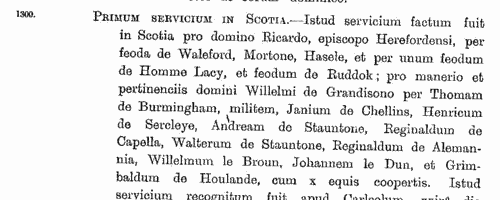
| The English in France
(1453)
King Henry VI of England (one of the grandsons of Charles VI of France) claimed the throne of France (and quartered the fleurs-de-lis of France with the lions of England on the royal standard) as had his predecessors since Edward III, as descendants of Philip IV of France. The English had real power or influence in Brittany, Normandy, Flanders and Gascony, and actual possession of several coastal garrisons, in particular Calais, where the French inhabitants had been replaced by English. Henry VI came to the throne only seven years after his father had trounced the French at Agincourt; but his cousin, Charles VII, who became king of France in the same year, spent his long reign rebutting the English king's claim to his throne by territorial reconquest and consolidation. The English administration kept a series of records called the French Rolls. On these are recorded royal appointments and commissions in France; letters of protection and safe-conduct to soldiers, merchants, diplomats and pilgrims travelling to France from England and returning, and to foreign legations. There are also licences to merchants to export to the Continent, and to captains to transport pilgrims. As Henry VI's reign progressed, and the English grip on northern France loosened, the French Rolls also increasingly include entries concerning the ransoming of English prisoners.BREUS. Cost: £6.00.  | Sample scan, click to enlarge
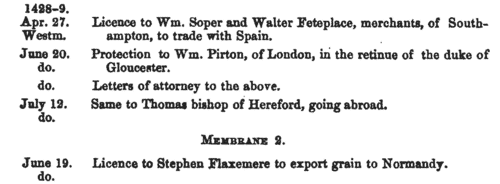
| Close Rolls
(1447-1454)
The close rolls of the 26th to 32nd years of the reign of king Henry VI record the main artery of government administration in England, the orders sent out day by day to individual officers, especially sheriffs of shires: they are an exceptionally rich source for so early a period. There is also some material relating to Wales, Scotland, Ireland and the English possessions in France. BREUS. Cost: £4.00.  | Sample scan, click to enlarge

| The English in France
(1454)
King Henry VI of England (one of the grandsons of Charles VI of France) claimed the throne of France (and quartered the fleurs-de-lis of France with the lions of England on the royal standard) as had his predecessors since Edward III, as descendants of Philip IV of France. The English had real power or influence in Brittany, Normandy, Flanders and Gascony, and actual possession of several coastal garrisons, in particular Calais, where the French inhabitants had been replaced by English. Henry VI came to the throne only seven years after his father had trounced the French at Agincourt; but his cousin, Charles VII, who became king of France in the same year, spent his long reign rebutting the English king's claim to his throne by territorial reconquest and consolidation. The English administration kept a series of records called the French Rolls. On these are recorded royal appointments and commissions in France; letters of protection and safe-conduct to soldiers, merchants, diplomats and pilgrims travelling to France from England and returning, and to foreign legations. There are also licences to merchants to export to the Continent, and to captains to transport pilgrims. As Henry VI's reign progressed, and the English grip on northern France loosened, the French Rolls also increasingly include entries concerning the ransoming of English prisoners.BREUS. Cost: £6.00.  | Sample scan, click to enlarge
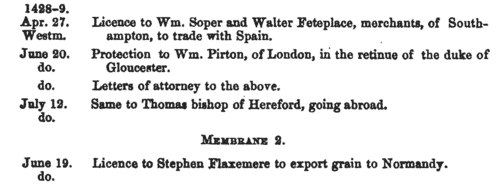
|
| 1 | 2 |  |
Research your ancestry, family history, genealogy and one-name study by direct access to original records and archives indexed by surname.
|












